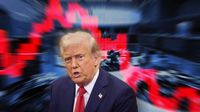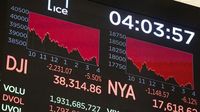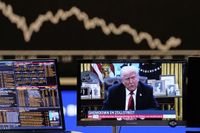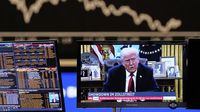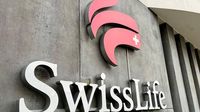The global stock market is experiencing significant turmoil as fears of a recession and rising inflation take hold, particularly in the wake of U.S. President Donald Trump's recent tariff announcements. On Monday, April 7, 2025, the Swiss stock exchange, along with others worldwide, opened with alarming losses, continuing the downward trend that began last week.
At the start of trading, the Swiss Market Index (SMI) plummeted by over six percent, demonstrating the extent of the panic among investors. By 9 AM, the SMI was down to 10,947 points, marking a stark contrast to its previous closing level of 11,648 points just days prior. This decline follows a particularly grim week where the SMI had already suffered losses exceeding nine percent, its worst performance since the onset of the COVID-19 pandemic in March 2020.
Among the hardest hit was Holcim, whose stock saw a staggering loss of over ten percent, leading to a temporary suspension of trading. Other significant players such as Swiss Re, Swiss Life, and Sika also faced trading halts amid the chaos. The situation was no better for the German DAX, which fell nearly ten percent to 18,489 points, reflecting similar turmoil across European markets.
In Asia, the sell-off was equally severe. The Shanghai Composite Index dropped by 4.4 percent, while the Hong Kong Hang Seng Index fell by 9.3 percent. Australia’s S&P/ASX 200 also hit a new 100-day low. The widespread losses are attributed to fears that the escalating trade war initiated by Trump’s tariffs could lead to a recession and increased inflation rates.
“The nerves are frayed,” commented a trader, reflecting the anxious atmosphere as market participants grappled with the implications of the U.S. tariff policies. Investors are concerned that the economic fallout from these tariffs could be severe, with many strategists, including those from JPMorgan, adjusting their models to account for a heightened risk of economic downturn.
Trump's recent tariff package has been a catalyst for this market upheaval, with the president asserting that tariffs are necessary to correct trade imbalances with other countries. His administration's aggressive stance has left many investors on edge, fearing that without significant negotiation progress, the market will continue to decline.
In the wake of the initial panic, trading patterns became erratic. For instance, the shares of Swissquote, Kardex, and EFG were initially reported to have plummeted by as much as 65 percent due to erroneous trades, which were later declared invalid by the Swiss exchange. By 10:45 AM, Swissquote had stabilized to an 8 percent loss, while EFG was down 9.5 percent.
The broader implications of this market turmoil cannot be understated. The SMI has now fallen below its previous year’s low of 11,065 points from February 2024, signaling a troubling trend for investors. The index's performance has raised concerns about the potential for a prolonged economic slump, as many worry that the volatility may lead to a broader financial crisis.
As the day progressed, losses continued to mount across various sectors. Financial stocks, in particular, bore the brunt of the sell-off, with Partners Group and UBS both experiencing significant declines. The luxury goods sector was not immune either, with companies like Richemont and Swatch also facing steep losses.
Meanwhile, the cryptocurrency market mirrored the stock market's downward spiral. Bitcoin fell below $80,000 for the first time since November 2024, further compounding the uncertainty in financial markets. Prior to Trump’s tariff announcement, Bitcoin had been valued at around $87,000, highlighting the extent of the recent downturn.
Analysts are drawing comparisons to past market shocks, noting that the current losses are reminiscent of the financial crisis of 2008 and the dot-com bubble burst in the early 2000s. The SMI's decline of over 12 percent since the tariff announcement places it among the most significant market disruptions in recent history.
In light of these developments, market experts are urging investors to remain cautious. The volatility seen in the markets is expected to persist as the implications of the U.S. tariff policies unfold. As one trader noted, “Investors are beginning to analyze the situation and selectively re-enter the market, particularly in stocks that are less exposed to U.S. trade relations.”
As the trading day continued, the Swiss stock market remained under pressure, with analysts predicting further losses as the day progressed. The outlook for the coming weeks remains uncertain, with many investors bracing for continued volatility as the situation develops.
In conclusion, the ongoing trade tensions and the resultant market reactions underscore the fragility of the current economic climate. With fears of recession looming large, investors will be closely monitoring developments in U.S. trade policy and its impact on global markets.

